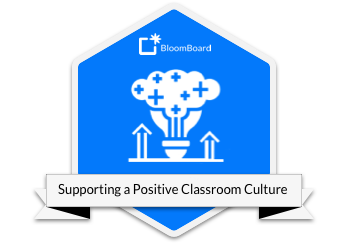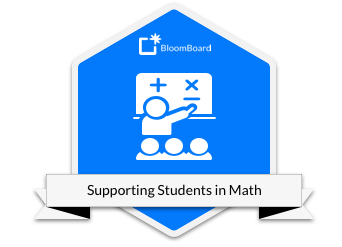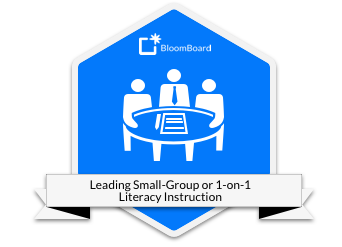BloomBoard Paraprofessional Portfolio-based Certification
The BloomBoard Paraprofessional Portfolio-based Certification validates the skills and experiences of job candidates by requiring participants to pass a series of portfolio-based assessments focused on the skills and competencies associated with successful paraprofessionals. This certification has been piloted and validated by numerous Adult Education entities across the state of Florida who provided feedback over a series or months to ensure the certification successfully prepares candidates to become employed as paraprofessionals in Florida districts.

Program Overview
This on-the-job program provides participants with the instruction, coaching, and certification needed to become an effective paraprofessional in Florida. Participants engage in collaborative and independent learning, and practice new skills in a workplace setting. They develop critical skills needed to impact student outcomes during one-to-one or small group instruction. This program consists of a series of portfolio-based assessments across three micro-credentials:



Incentives
Participants who successfully complete this program earn an industry-recognized credential and are ready for employment as a paraprofessional in the local school system, filling an immediate need in the K-12 education system. Furthermore, completers may also be eligible to participate in Governor DeSantis’ new teacher apprenticeship initiative to become a full-time teacher.
How to Register
Participants may register for this program in one of the following ways:
- Your local Florida adult education program may offer this program as a course, where you will have a teacher, synchronous meeting times, and personalized coaching through the portfolio creation process. Providers typically implement this program over the course of one term, or between 12 and 18 weeks. Contact your local adult education program to determine course availability.
- If you are not taking the coursework through an adult education program or a training provider, complete this form to register for the portfolio-based assessment only.
Program Supports
Orientation
Once you’ve completed enrollment, you’ll be invited to a kickoff orientation with your program facilitator/coach and other educators in your cohort.
Success Academy
Following the orientation, attend the BloomBoard Success Academy to help support the first micro-credential submission.

1:1 Coaching
BloomBoard coaches are available for personalized 1:1 support during the program.

Asynchronous Discussions
Throughout the program, you can communicate with your coach and other educators in your cohort through the BloomBoard platform.
Learn more
Complete the following form to get more information about the program.
Security
Requirements
The BloomBoard Paraprofessional Portfolio-based Certification is always taken in a secure environment and reviewed by a third-party certified assessor. See below for more information.
When a student engages in the assessments, they are prompted to agree to BloomBoard’s Academic Integrity policy which states the following: “All content within this micro-credential submission is my own original work and is submitted in compliance with the Terms of Use and any applicable academic integrity policy of my school or district, and that all artifacts and evidence contained in the submission are an authentic representation of my work. If the issuer believes that any content in the micro-credential submission is plagiarized or otherwise violates the Terms of Use, I understand that BloomBoard may report the submission and take any other action permitted by the Terms of Use, including denial of a micro-credential submission, revocation of a previously earned micro-credential, and suspension of my bloomboard.com account.”
Only certified BloomBoard assessors have access to the portfolios of evidence. Each certified assessor signs nondisclosure agreements and all evidence submitted for assessments is stored in the BloomBoard platform and is not downloaded by assessors onto local computers.
BloomBoard assessors are education professionals with a Master’s Degree and an average of ~15 years of experience teaching, coaching, mentoring, and evaluating fellow educators. Each assessor is certified by successfully earning a micro-credential which determines that they can consistently achieve at least 80% alignment to a true score when assessing and providing quality feedback.Once potential assessors have achieved certification, they must participate in ongoing training and calibration.
Procedures
BloomBoard’s platform confirms the student test-taker identity as students engage in the portfolio-based assessments in the BloomBoard Paraprofessional Portfolio-based Certification by logging into their secure account on BloomBoard’s online platform. Every student must use their unique login credentials to access their assessments and agree to BloomBoard’s Academic Integrity policy. BloomBoard’s platform utilizes email verification to confirm the identity of platform users. In addition, because each assessment includes performance-based requirements such as videos of the student practicing a specified activity, assessors can also visually confirm the identity of each participant when reviewing their video submissions. This ensures electronic exams are delivered securely.
BloomBoard’s platform system utilizes duplication-detection software, and assessors are trained to confirm that each portfolio submission is unique and reflects the effort of the individual student to ensure any testing irregularities are identified and addressed. In many instances, portfolio assessments require video evidence of an individual, providing an extra layer of assurance that an individual is submitting their own work. Any evidence considered duplicated from another submission may be deemed non-eligible evidence for purposes of earning a micro-credential. Students will be notified through assessment feedback in the BloomBoard platform when duplicate evidence is present in their submission, and the pre-defined criterion will be assessed as “Not Met” (all criteria across all artifacts must be scored as “Met” to pass). Additionally, students will receive an auto-notification through BloomBoard Support outlining how their submission contains duplicate evidence and the next steps for resubmission. Any duplicated evidence must be removed and the student will need to resubmit their unique evidence to move forward with the assessment process and earn the micro-credential. If a student receives more than one duplicated evidence violation, they will receive a formal communication notifying them that their access to the BloomBoard platform and the BloomBoard Paraprofessional Portfolio-based Certification program may be revoked.
Proctoring and Review
According to Florida Code 6A-6.0576, certifications that qualify for inclusion on the Funding List must “require all written examinations be proctored by a third party and not proctored by the individual providing direct instruction for the industry certification.” The BloomBoard Paraprofessional Portfolio-Based Certification validates the skills and experiences of job candidates by requiring each participant to develop a portfolio of evidence focused on the competencies associated with successful paraprofessionals. The portfolio requires non-traditional forms of performance-based assessments, including video submissions, vs a traditional written exam. However, virtual proctors are required to review the videos and submissions before they are scored by assessors.
Blueprint
Testing Blueprint
The BloomBoard Paraprofessional Portfolio-based Certification consists of portfolio-based assessments focused on competencies (knowledge and skills) associated with successful paraprofessionals. To pass the exam, students must submit the following artifacts across the 3 micro-credentials to demonstrate a total of 44 competencies:
- Supporting a Positive Classroom Culture: 3 artifacts, including a self-evaluation, an interview, and a case study
- Supporting Students in Math: 3 artifacts, including analyzing errors in student work, video of the participant’s instruction of students, and video analysis
- Leading Small Group or 1-on-1 Literacy Instruction: 3 artifacts, including a case study, a text analysis, and a video of the participant’s instruction of students
These competencies assess participants’ mastery of demonstrated outcomes listed below. These demonstrated outcomes align to Florida Department of Education standards from the CTE Principles of Teaching Career Certificate Program.
BloomBoard Paraprofessional Portfolio-based Certification demonstrated outcomes
- Identify appropriate personal and professional conduct for the workplace.
- Establish a positive professional relationship with cooperating teachers.
- Establish positive relationships with students.
- Understand how to reinforce and respond appropriately to academic and social behaviors.
- Recognize the paraprofessional’s role in supporting effective math instruction.
- Apply strategies to solve problems and support students’ number sense and algebra learning.
- Apply strategies to solve problems and support students’ geometry and measurement learning.
- Apply strategies to solve problems and support students’ data analysis learning.
- Recognize the paraprofessional’s role in supporting effective literacy instruction.
- Develop text-dependent questions that will support student comprehension of a text.
- Lead a small group or one-on-one literacy lesson after co-planning with a lead teacher.
Sample of FLDOE-aligned standards (from Principles of Teaching Career Certificate Program)
- Demonstrate professionalism in an education and training setting
- Analyze and evaluate developmentally appropriate classroom management strategies
- Demonstrate competence in the content/subject area to be taught
- Use content-specific instructional strategies
- Align instructional goals and activities with school and district priorities and Florida’s academic and technical content standards
- Demonstrate knowledge of effective literacy strategies that can be applied across the curriculum
- Plan and deliver instruction that illustrates best teaching practices
- Communicate clear learning goals and link learning activities to those defined goals
- Apply knowledge of how students think and learn to instructional design and delivery
- Differentiate instruction to support the learning needs of all students
- Design activities to help students develop as independent learners and complex problem-solvers
- Use resources to effectively enhance student learning